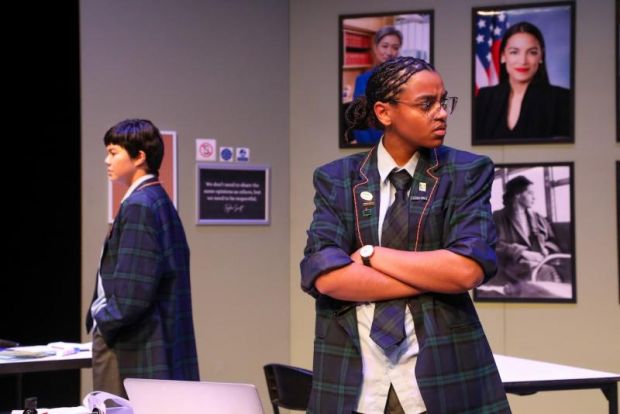By Emmanuelle Mattana. Director Marni Mount. Seymour Centre. 19 Jun – 7 Jul, 2024
Reviewed : 21 June, 2024*

Like director Marni Mount, as soon as I read about this play I wanted to see it. I wanted to see how Emmanuelle Mattana would approach the intricate cobweb of the topic, how the stickiness of the web would become theatre, how the female cast would become the “elite private schoolboys” for whom Mattana would spin their web – and how it would entrap an audience.
As I read the ‘content warnings’ in the program, I knew I wouldn’t be disappointed! It looked like Mattana hadn’t held back – and the astonishing production proved it. Somehow this incredibly talented and intuitive playwright has managed to incorporate the themes of “entitlement, intellectual elitism, exclusivity, misogyny, classism, racism and homophobia” in a play that is confronting and compelling. It challenges it cast by demanding ‘drag’ and dance and dramatic dissertation. It challenges its audience by demanding recognition and change.

Mattana sets the four schoolboys in the rarefied environment of a closed classroom preparing for a competitive senior high school debate. The boys are bright, confident, used to winning – and derisive of their private school girl competition. They refer to competitive debating as the ‘game’ it is – where winning is the aim and arguing convincingly about something you know little about and probably don’t believe in are the ‘tries’ and ‘goals’ of the game.
When the boys find their topic is “that feminism has failed women”, their misconceptions and prejudices fire in a confusion of toxic anti-feminist, misogynistic arguments that are cringingly funny – and enlighteningly telling. Mattana hasn’t pulled any punches. They write from personal experience and recorded fact. How they write about it, how Marni Mount directs – and how the female cast boldly depict their schoolboy characters – make it challengingly and, testingly, believable.

Mount sets the production in a ‘closed’ classroom watched over by photographs of strong, internationally renowned women. In that environment the boys can speak with the enthusiastic over-confidence of the young and entitled. In their grey shorts, long socks, grey shirts, school ties, tartan blazers and badges of office, they dissect the topic with unmitigated verve – including a lewd dance routine and some childish bickering.
The acting of these four young women shows a remarkable ability to observe carefully and imitate effectively!
Emmanuelle Mattana plays Owen, the articulate, authoritative, wordsmith scholarship boy whose ambition is high politics. They make Owen bright, a bit touchy but quick to defend himself, annoyingly well-informed, and a little alone in the ‘team’. He is watchful, thoughtful, calculating – and, as it turns out eventually, the most able to manipulate and sway.

David is played by Leigh Lule who makes the character thoughtful, shrewd, always part of the action but able to step back a little and control when things get heated or inane. As happens when Scott (Gaby Seow) and Jared (Fran Sweeney-Nash) air their fatuous opinions or take the discussion off the topic. Seow makes Scott almost a by-stander at times, alert and involved but somehow apart – for reasons that become apparent later in the play.
Sweeney-Nash plays the ‘innocent’, knock-about, over-friendly “I love women” character, sometimes a little bemused by the arguments but solidly part of the team, until he feels the pressure of accusation … and a declaration from Scott.
Marni Mount describes Trophy Boys as ‘a masterful interrogation of the ways that entitlement, abuse and absolution are tied up with one another”. She commends the “pace, tone and language” of the play – and the cleverness of its construction – all of which she ensures are central to her direction. This play is one of a kind in so many ways and Mount realises its importance in this very frank and fearless production.
First published in Stage Whispers magazine
*Opening Performance